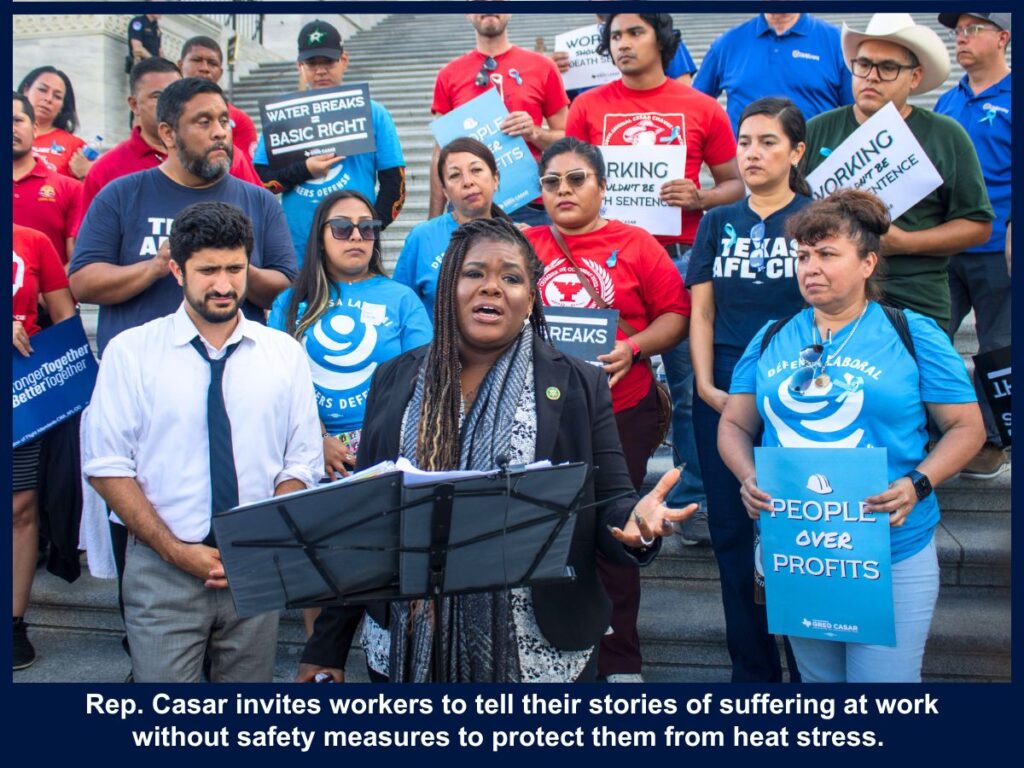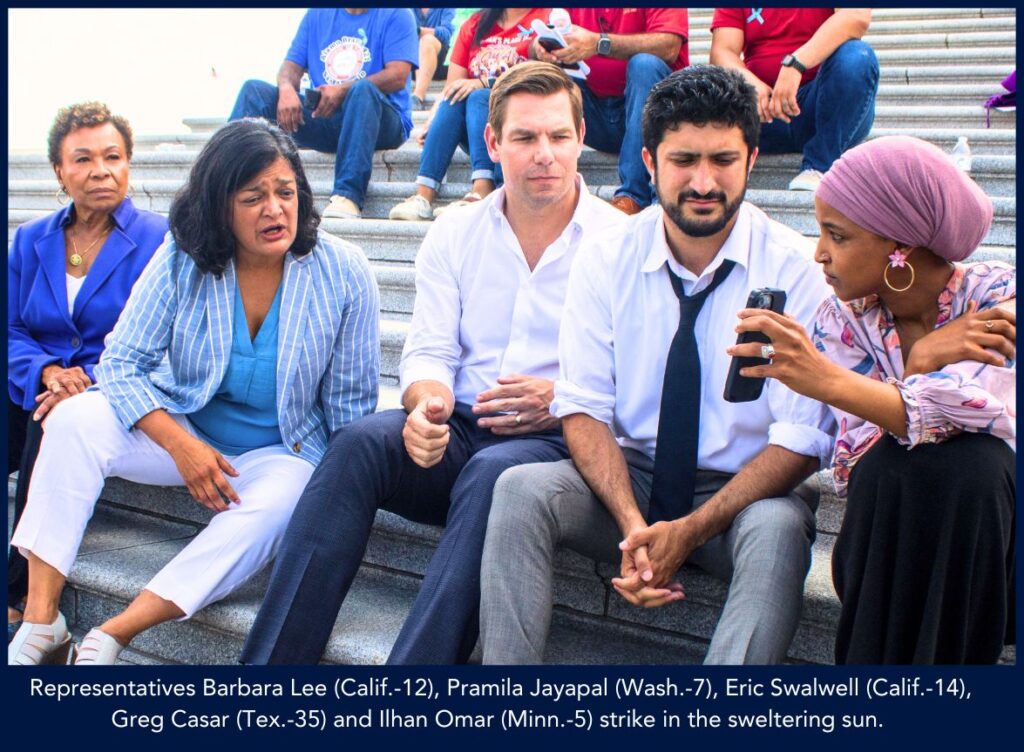Representative Greg Casar Goes on a Thirst Strike
American workers need protection from deadly heat
By Dani Klein

On Tuesday, July 25, Representative Greg Casar (D-Texas) staged an 8-hour thirst strike on the U.S. House steps to call attention to the need for federal heat stress protections for workers.
From Casar’s last drink of water around 10:25 a.m. until around 7 p.m. that evening, Casar and his allies continuously spoke to the press and other supporters of the demonstration about the need to protect workers from extreme heat. Casar was surrounded by union workers, labor organizers, and other activists from Texas and around the country. Several workers, activists, and family members of workers who lost their lives to heat stress told their stories in the 94-degree heat on the Capitol steps.
Throughout the day, House Minority Leader Hakeem Jeffries (D-N.Y.), Senator Bernie Sanders (I-Vt.), Rep. Alexandria Ocasio-Cortez (D-N.Y.), Rep. Maxwell Frost (D-Fla.), Rep. Al Green (D-Texas), Rep. Sylvia Garcia (D-Texas), and more made appearances and delivered remarks, supporting Casar and other demonstrators.
Rep. Casar, who represents parts of San Antonio and Austin, has taken a leadership role in the effort to address life-threatening heat in Texas. Government data shows that Texas is the state where the most workers die from high temperatures.
Twenty-one of the last 22 years were the hottest on record in the U.S. with 2023 now virtually certain to be among the top five hottest years. And 2024 is expected to be even hotter. Texas has been one of the U.S. states most affected by intense, weeks-long heat waves.
Heat exposure causes as many as 2,000 worker fatalities in the U.S. annually, and up to 170,000 workers in the U.S. are injured in heat stress-related accidents each year. These numbers get even higher with the added environmental stress of the wildfire smoke that has blanketed the U.S. this summer. The workers who experience these hazardous and life-threatening conditions are disproportionately Black, Brown, and low-income Americans.
There are many cheap and simple ways that employers can make working conditions safer in dangerous heat levels, such as providing frequent access to cool water and break in the shade or air conditioning. However, in June of 2023, as Texas temperatures were consistently hitting triple digits, Texas Governor Greg Abbott signed a bill that overturned all Texas local ordinances requiring construction employers to provide water breaks to their workers. Those who supported Governor Abbott’s bill to outlaw mandated water breaks argue that any local regulations on breaks for construction workers are unnecessary because the right to safe working conditions is already guaranteed by the Occupational Safety and Health Administration (OSHA). However, OSHA has no specific rule on occupational heat stress.

Rep. Casar and 111 other members of Congress sent a letter to the Biden Administration urging it to issue an OSHA workplace heat safety standard with the “fastest possible implementation.”
The process of creating the heat standard began in 2021, but the OSHA rulemaking process can often take up to seven or eight years. This issue is too urgent to wait for OSHA to deliver a final rule when thousands of worker injuries and illnesses could be avoided in the U.S. each year with an effective OSHA heat standard.
Congress can empower OSHA to issue an interim heat safety standard that could protect workers from inhumane conditions until a final rule can be completed. Led by Senators Sherrod Brown (D-Ohio), Alex Padilla (D-Calif.) and Catherine Cortez Masto (D-Nev.) and Representatives Judy Chu (D-Calif.), Raúl Grijalva (D-Ariz.), Alma Adams (D-N.C.), and Bobby Scott (D-Va.), the Asuncíon Valdivia Heat Illness, Injury and Fatality Prevention Act would require OSHA to put that interim heat rule in place. The act is named after a California farmer who died of heat stroke after working a 10-hour shift picking grapes on a July day.
Beyond mandating an interim heat safety rule from OSHA within one year of the bill’s passage, the bill also requires employers and workers to undergo heat safety training as the U.S. heads towards another decade of record-breaking heat.
On Thursday, July 27, President Biden announced that his administration plans to commit $7 million to developing more detailed predictions for extreme weather like heatwaves. Biden also directed the Labor Department to issue the first ever heat hazard alert and increase inspections of workplaces where workers are exposed to heat hazards such as farms and construction sites.. However, Biden has not announced that he will direct OSHA to issue the interim heat safety rule that the Asunción Valdivia Heat Illness, Injury and Fatality Prevention Act calls for.
To urge OSHA to act, workers and their allies must call on their members of Congress to support this legislation so that OSHA will be required to make an interim rule providing an immediate increase in heat protections for workers. Take action here to support workers.
As signs at the thirst strike stated, “Working shouldn’t be a death sentence.”